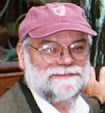I've been "training" for a 14-mile (28 miles round trip) hike into Montana's Bob Marshall Wilderness. Since I am 69 years old, such a long trip into the Wilderness is a serious matter. I have to be physically and mentally prepared for the challenge. To get ready I've been doing long hikes in Metroparks all around the East Side of Cleveland--the Cleveland Metroparks, the Lake County Metroparks, and the Geauga County Metroparks. I love all these park systems. The Cleveland system is the biggest and oldest, and it is magnificent. I've been hiking the North Chagrin Reservation, an awesome assemblage of forests, meadows, streams, ponds, and picnic areas. And I've been going into this huge park since I was a little kid growing up in Euclid. I love Squire's Castle, Strawberry Lane, Forest Lane, Sunset Pond, and all the trails and the wonderful diverse woods and ravines in North Chagrin. I hiked seven miles there yesterday, a great day.
Earlier this week I hiked the length of Chapin Forest in Kirtland, Ohio.
Besides a rich woods of sugar maple, beech, black cherry, red oak, and myriad other trees and shrubs, Chapin has some unusual geological features. It has caves and ledges, and a lot of rock called Sharon Conglomerate, a sandstone filled with luckystones (rounded milky quartz stones). The luckystones are one of the characteristic features of our Lake Erie beaches--they are found in Cuyahoga, Lake, and Ashtabula Counties (and probably on beaches in Pennsylvania and New York)--and nowhere else that I know of. As a toddler in Willoughby, Ohio, we would collect luckystones, put them under our pillows at night, and trick the tooth fairy. This always worked--as long as we told my Grampa about the plan.
Here is a photo I took of Sharon Conglomerate:
Another wonderful feature of Chapin Forest is Gildersleve Mountain, a high hill in the Forest that looks north to Lake Erie, rising 593 feet above the Big Lake, 6.7 miles to the north. Part of the hill has been quarried, so there is a precipitous drop-off at the top. By the way, very few people know the name "Gildersleve Mountain." It is part of local lore and it needs to be preserved. Here is a view of the lake from Gildersleve. My cell phone camera cannot do it justice. On a clear day you can see 18 miles to the skyscrapers in downtown Cleveland. An odd thing is that it looks like the entire area is a forest, when it is really a large, densely populated city. It brings to mind the old nickname of Cleveland: the "Forest City."
About 1.5 miles from Gildersleve is another historic quarry, where the stone for the Kirtland Mormon Temple was quarried in the early 1830s. Part of that is now a pond. And just north of the pond you can see an area where huge blocks of stone were quarried.:
The forest in this park is full of huge trees and I ran across a stump about 4-feet in diameter, the remains of an old red oak:
There are many huge trees in this forest, but some of them are dying, especially the white ash; they are being annihilated by the emerald ash borer. The ash trees are facing the same devastation that has met the American Chestnut and the American Elm. I have seen some small chestnut trees and many elm trees in local woods. Some elm trees have survived, but there has been a huge die off since my childhood. Will any ash trees somehow demonstrate immunity to the emerald ash borer? Time will tell.
Almost every day I walk in a different park. I love them all, but Chapin is near the top of the list.
Subscribe to:
Post Comments (Atom)







No comments:
Post a Comment